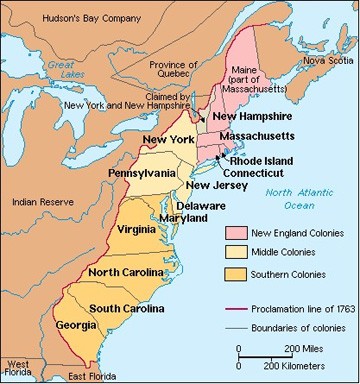- A revolution is a rapid and significant change in society, politics, technology or the economy.
The first of these revolutions took place in North America.
The Causes of the American Revolution
From the 1600s, Britain, ruled by King George III had established thirteen Colonies along the eastern seaboard of North America. The colonists were from Britain and other European countries and were largely allowed to run their own affairs through their local assemblies. The British Crown was represented in each colony by a governor. between 1650 and 1750, the population in the colonies grew to two million and they became very prosperous through the trading of tobacco, grain, cotton and fish. Many colonists left their home to escape religious or political persecution, while others saw it as a chance to become wealthy.

By the 1760s, various factors had come together to make the colonies unhappy with the British Rule.
This is why:
1. The Age of Enlightenment
- Enlightenment is a movement of thinkers who valued reason and science above faith or authority as a basis for Society.
Many of them challenged the idea that Kings had a divine right to rule. Instead, they argued that the power of government should be limited and the rights of the people protected.
2. Restrictions on Trade
Britain wanted a cheap supply of raw materials like cotton, for expanding industries and saw America as a good for these. However Britain did not want American Competition for its Industries. They wanted America as a market to sell the finished goods made by British Industry using American materials.
The Navigation Acts forced the colonies to sell some of their produce (cotton, sugar, tobacco) to Britain alone. This meant that the British could decide the price, as the Americans had nobody else to sell to.
3. The Seven Years' War
France had also settled colonies in North America. During the Seven Years War, The British had defeated them and seized most of their territory. Huge numbers of British soldiers fought in America and the British Government wanted the colonies to contribute to the cost of the army as it was there for their protection.
4. No Taxation without Representation
The British introduced the Stamp Act requiring all legal documents, wills, newspapers, certificates and playing cards to have a government stamp which had to be paid for.
They also introduced the Quartering Tax which imposed taxes to cover the cost of soldiers in the colonies. Colonists were also required to give the British Soldiers a place to stay and food to eat.
The Colonists did not want to pay more taxes and they especially resented taxes being forced upon them by a parliament in London in which they had no representatives. Colonists began to use the slogan 'No Taxation without Representation' There were widespread protests and violence against the stamp act in particular. 'Stamp men' were beaten up and tarred and feathered and the act was withdrawn in 1766.